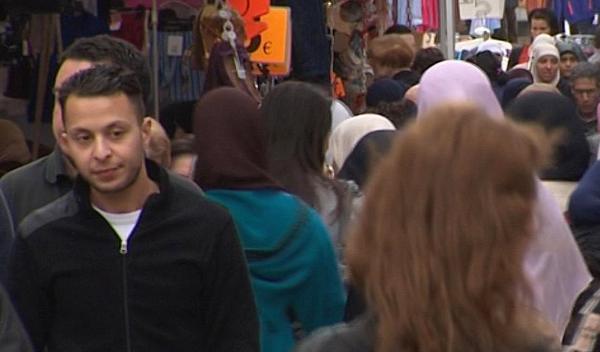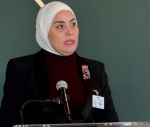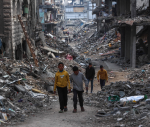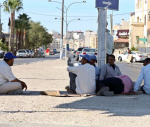You are here
Paris attacks suspect charged in Belgium, fights extradition
By Reuters - Mar 19,2016 - Last updated at Mar 19,2016
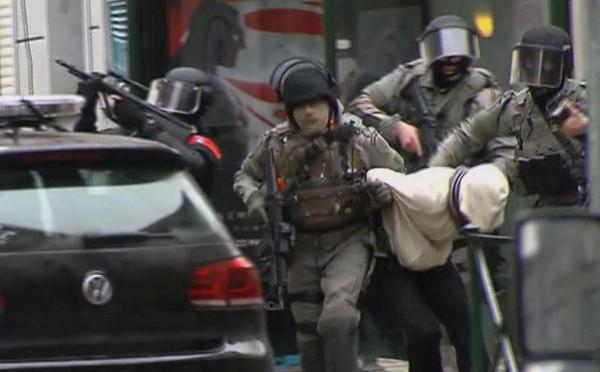
In this framegrab taken from VTM, armed police officers escort a suspect to a police vehicle during a raid in the Molenbeek neighbourhood of Brussels, Belgium, on Friday (AP photo)
BRUSSELS — Salah Abdeslam, the prime surviving suspect in November's Paris attacks, answered questions from Belgian investigators on Saturday, but will fight extradition to France, his lawyer said.
Belgian prosecutors said Abdeslam and a second man arrested with him on Friday were charged with "participation in terrorist murder".
"He is cooperating with Belgian justice," his lawyer Sven Mary told reporters, adding Abdeslam, bedridden after being shot in the leg during his capture, admitted being in Paris on November 13.
His elder brother was among the suicide bombers in the attacks that night that killed 130 people. France's BFM TV said Salah Abdeslam confessed that he had planned to blow himself up as well. Abdeslam's lawyer and Belgian officials could not be reached for comment on the report.
Mary said that the 26-year-old French national, born and raised in Brussels in a Moroccan immigrant family, would refuse the extradition demanded by French President Francois Hollande, who was at the football match targeted by the bombers.
Legal experts said his challenge was unlikely to succeed but would buy him more time to prepare his defence.
After a night in a Brussels hospital, he is expected to be moved to a high-security jail in the western city of Bruges while legal proceedings continue.
French and Belgian leaders have hailed his arrest, several days after Brussels police stumbled on his fingerprints during a raid that turned violent, as a turning point in clearing up the Paris attacks, in which all the identified assailants were shot dead or blew themselves up.
It may also help disrupt other militant cells that Belgian Foreign Minister Didier Reynders said were certainly "out there" and planning further violence.
"We've won a battle against the forces of ignorance but the struggle isn't over," Belgian Prime Minister Charles Michel said. The case has raised tensions with France but Michel and Hollande, who was in Brussels for a European summit when Abdeslam was arrested, praised each others' security services.
Flight risk
Interpol issued an advisory to border guards about fleeing accomplices. A Belgian, 31-year-old Mohamed Abrini, is still on EU police agency Europol's "Most Wanted" list after being caught on CCTV with Abdeslam.
Abdeslam, on the run for four months, was found just a few hundred yards from his parents' home in the rundown North African quarter of the Molenbeek district.
A man using false papers in the names of Amine Choukri and Monir Ahmed Alaaj was also charged with terrorist murder. As Choukri, he was documented by German police at Ulm in October when he was stopped in a car with Abdeslam.
A third man in the house was charged with belonging to a terrorist organisation and he and a woman were charged with concealing criminals.
Police had sought Abdeslam since he called two acquaintances in Belgium in a panic hours after the attacks to have them come collect him and bring him home. Suspected to be as far away as Syria, it seems he was in Brussels all or most of the time.
Security agencies' difficulties in penetrating some Muslim communities, particularly in pursuit of Belgium's unusually high number of citizens fighting in Syria, has been a key factor in the inquiry, along with arms dealing in Brussels.
Paris relief
As Parisians, and families of the victims, voiced relief at the arrest, French Interior Minister Bernard Cazeneuve said after an emergency cabinet meeting that a trial could answer questions for those who suffered in the attacks.
"Abdeslam will have to answer to French justice for his acts," he said. "It is an important blow to the terrorist organisation Daesh in Europe."
A trickle of people came to a makeshift memorial in Paris that has engulfed the monument at Place de la Republique, near the scene of much of the bloodshed, to pay their respects.
"It's really a relief," said Emilien Bouthillier, who works in the neighbourhood. "I can't wait for Belgium to transfer and return him to France so he can be tried the way he should be."
Friday's heavily armed swoop came after fake passports and Abdeslam's fingerprints were found following a bloody raid on Tuesday in which Mohamed Belkaid, a 35-year-old Algerian was shot dead and police officers wounded.
Near the scene of the arrest, newsagent Dominique noted that Abdeslam had been well known to him and many in the community.
"He was a very nice lad before," he said. "How can things go this far? That's really something else."
His elder brother Brahim, a Brussels barkeeper who shared a chequered history of drugs and petty crime, blew himself up outside a Parisian cafe on the night of the attacks.
There has also been speculation, associated with the finding of an abandoned suicide vest in Paris, that the younger brother had been meant to kill himself but changed his mind.
The report by France's BFM television said he confessed on Saturday to having planned to detonate the vest along with three others at a France-Germany football match at the Stade de France.
A four-month inquiry that had seemed to go cold, heated up when French and Belgium officers went to an apartment in the southern Brussels suburb of Forest on Tuesday.
Thinking they were simply looking for physical evidence, they were instead confronted by at least two people spraying automatic gunfire at them as they opened the door.
Later, local media said, a tapped telephone led police to a mobile phone number used by Abdeslam and, by triangulating the device's location, established that he was at the house in rue des Quatre-Vents in Molenbeek. After media broke word that his fingerprints had been found, police moved in and seized him.
Related Articles
PARIS — Salah Abdeslam, believed to be the sole survivor among a group of militants who killed 130 people in Paris in November, was extradit
BRUSSELS — Belgium's chief prosecutor named two brothers on Wednesday as Daesh suicide bombers who killed at least 31 people in the most dea
BRUSSELS — The only surviving suspect in the 2015 Paris attacks accused a Belgian court on Monday of bias against Muslims, saying he put his


